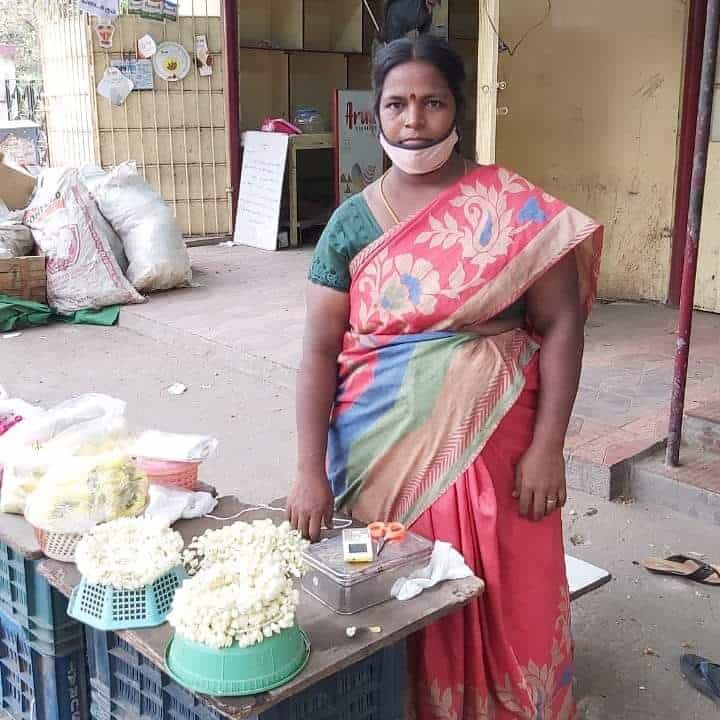Rajeshweri S. Silambarasan V. Krishnamurthy P. Not names you would be familiar with, but just a few among the thousands of street vendors in Chennai who have survived the lockdown.
Around two and a half months ago, Rajeshweri used to sell flowers at Nesapakkam; Silambarasan ironed clothes at Mugalivakkam and a small roadside juice shop at Nanganallur won bread for Krishnamurthy. What ties them together today is poverty and uncertainty; the lockdown and the apathy of the Greater Chennai Corporation (GCC) have thrown their lives into disarray.
However, what saw them through the travails of the period was the monetary aid received from citizens, proving yet again that volunteerism can be a real solution in a crisis. Hundreds of street vendor families have availed monetary help from organisations such as United Way Chennai, a not-for-profit organisation that works in the areas of health, education and financial stability and Bhumi, a youth volunteer non-profit organisation.
“I would not have been able to feed my 6-year-old daughter if not for that money,” says Rajeshweri, who used to earn Rs 100 to Rs 200 per day before COVID struck, by selling a variety of flowers such as jasmine, roses and chrysanthemum. Her husband who used to earn Rs 500 a day is also jobless now. Silambarasan spent the money he received by way of help in buying dry rations for the family and Krishnamurthy and his family could afford two square meals a day because of the help received.
The power of volunteerism
Street vendors are an integral part of Namma Chennai. The Street Vendors (Protection of Livelihood and Regulation of Street Vending) Act, 2014 identifies it as a serviceable sector, as these sellers keep their profit margins very low. It is also the reason why a large chunk of poor and lower-middle-class people buy from them.
The very same reason underlines the need to help them when they are in such dire straits, says Shruti Ganesh, Marketing and Communications Manager, United Way Chennai.
The Corporation database has only 12,000 registered street vendors in Chennai, but in reality, there are more than a lakh of them. Not everyone is a registered member.
The organisation has initiated a social media campaign called #UnitedForStreetVendors, requesting citizens to contribute to the cause. Vegetable sellers, vendors who owned juice shops and flower sellers — the list of beneficiaries goes on.
“The fraternity leads a hand-to-mouth existence anyway. For the cost of two Swiggy-delivered meals, a citizen can help a street vendor’s family,” says Shruti. The organisation has till date helped more than 200 street vendor families by donating a month’s pay.
Bhumi, too, has been working on sustainable development of street vendors for quite some time now. “The procedure is simple. Our volunteers identify street vendors in distress, verify their bank accounts, collect funds and make direct cash transfers to the beneficiaries,” explains Dr Prahladhan KK, co-founder of Bhumi. The organisation has helped 589 street vendors families in Chennai by transferring a total sum of 25.88 lakh.

Pattuna, a flower seller and one of the beneficiaries. Pic: United Way Chennai
Life in the post-COVID era
As the city slowly gets unlocked, one can see street vendors making a comeback on some streets to resume their business. But are citizens or buyers back? Unfortunately, no. The reservations among buyers are also legitimate, given that a majority of street vendors neither use masks nor sanitise their hands regularly enough.
“Herein lies the responsibility of multiple stakeholders. GCC which makes announcements about social distancing through loudspeakers in various localities can make attempts to sensitise street vendors as well. A small message asking vendors to use masks, and requesting citizens to promote them can bring about a significant transformation,” says Arjun Nagu, a citizen activist, who is himself working to sensitise street vendors on the need for hygiene.
“Street vendors are enterprising and independent. There is a general acceptance of the situation and most of them do not open up about their problems, until they realise that you want to help them,” added Shruti Ganesh.
Acceptance has led to adaptation among the urban poor in general: a differently-abled man who worked in a vegetable shop before the lockdown is now selling veggies on the streets; an auto-driver has taken to selling tender coconuts and one who used to provide part time domestic services is now selling flowers. This only shows that many of them fall back on street vending during tough times. All the more reason for the relatively better off, who benefit from their services, to stand by them today.
Citizens can donate to Bhumi or United Way Chennai to make a difference. You can identify a street vendor in need and pass the information to the Bhumi’s helpline: +91 99997 13542 Or even simpler, just reach out to the vendors in your neighbourhood, talk to them, find out about their needs and donate
